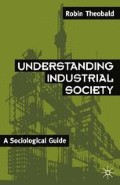Abstract
It was suggested in the previous chapter that an industrial economy is one in which inanimate sources of power are harnessed to the production of material goods. Technological advances in the eighteenth century, the introduction of new types of machinery and the development of steam power, vastly increased the productive capacity of the economy. But merely producing more is of little benefit unless what is produced can be consumed. Accordingly industrialisation was fundamentally associated with the development of markets for the sale of the goods which the system could now produce. Without these markets, without the possibility of selling the goods, the pioneering industrialists — factory owners, ironfounders, railway builders — would hardly have invested money, time and energy in bringing together factors of production and organising the productive system. In other words, the prospect of making a profit was and is the salient feature of the capitalist system; in fact the driving force behind it. This is a very important point since there have been industrial societies where the profit motive is not the central principle of organisation. In the Soviet bloc countries, prior to its breakup, the needs of their citizens and not profit theoretically provided the rationale behind what was produced and how it was distributed. Socialist industrial societies have centrally planned economies in which factors of production and goods and services are allocated on the basis of planning decisions rather than the market forces of supply and demand.
Preview
Unable to display preview. Download preview PDF.
Bibliography
Braudel, F. (1983) The Wheels of Commerce (London: William Collins). ‘Capitalism’, Encyclopaedia Britannica.
Harrison, J. F. C. (1984) The Common People (London: Fontana).
Hill, C. (1969) Reformation to Industrial Revolution (Harmondsworth: Penguin).
Postan, M. M. (1972) Mediaeval Economy and Society (Harmondsworth: Penguin).
Weber, M. (1976) The Protestant Ethic and the Spirit of Capitalism (London: Allen & Unwin).
Author information
Authors and Affiliations
Copyright information
© 1994 Robin Theobald
About this chapter
Cite this chapter
Theobald, R. (1994). Capitalism and Industrialism. In: Understanding Industrial Society. Palgrave, London. https://doi.org/10.1007/978-1-349-23225-3_3
Download citation
DOI: https://doi.org/10.1007/978-1-349-23225-3_3
Publisher Name: Palgrave, London
Print ISBN: 978-0-333-48539-2
Online ISBN: 978-1-349-23225-3
eBook Packages: Palgrave Social & Cultural Studies CollectionSocial Sciences (R0)

